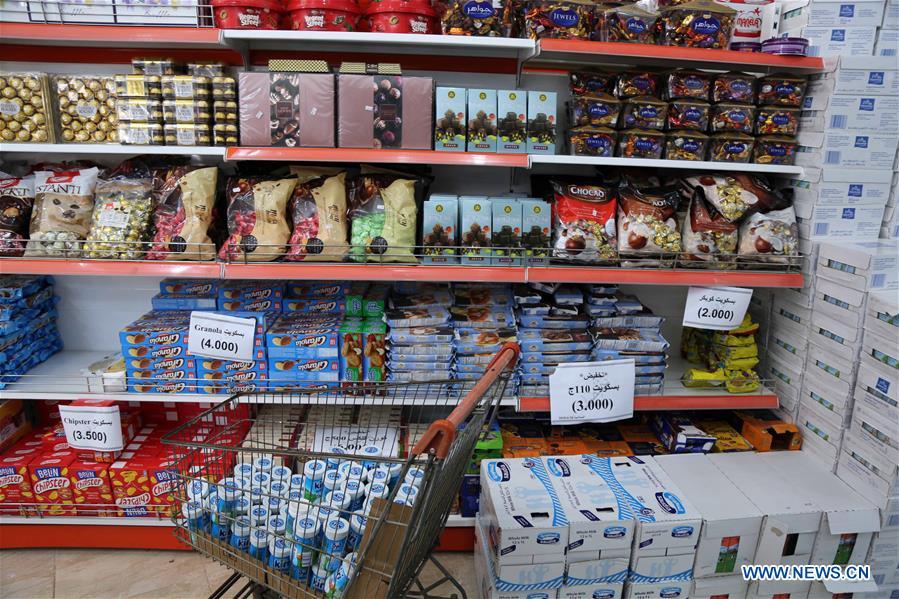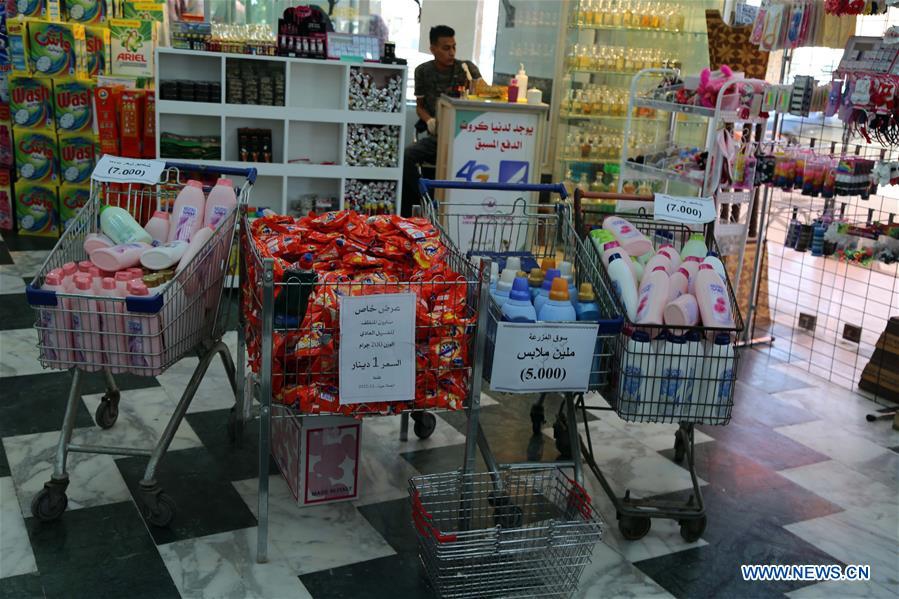Feature: Libyans struggle with rapid price hikes caused by anti-coronavirus measures

Goods are marked with new prices at a supermarket in Tripoli, Libya, on June 16, 2020. The decrease in the flow of foods across Libyan borders with Egypt and Tunisia has led to increase of prices in the country. The prices of some goods have gone up by 50 percent or even doubled or tripled since March. As a precautionary measure against the COVID-19 pandemic, Libyan authorities closed all the country's borders in March. (Photo by Mohamed Arhoma/Xinhua)
Tuhami Milud, a convenience store owner in the Libyan capital Tripoli, felt the pain of his customers who were stunned by the sharp hike in the prices of some foods and goods amid the COVID-19 outbreak.
"Whenever people come to buy vegetables or foodstuffs, they notice a rise of prices by half from the previous supply and some prices even double," Milud told Xinhua.
"Are we going to stop buying food at a higher price and eventually starve?" he asked.
Indeed, the precautionary measures taken against the COVID-19 pandemic continue to affect the daily lives of Libyans, especially with the closure of many economic activities and subsequent price hikes.
The decrease in the flow of foods across Libyan borders with Egypt and Tunisia has led to increase of prices across the country. The prices of some goods have went up by 50 percent or even doubled or tripled since March.
Milud said most of his products come from Egypt and Tunisia across land borders, so the prices increased either due to their sources or because of the transportation costs.
As a precautionary measure against the COVID-19 pandemic, Libyan authorities closed all the country's borders in March.
Truck drivers struggle as they are forced to enter a quarantine for two weeks after transporting goods to the country. Therefore, many merchants choose to import by sea or air.
Khairia Al-Wafi, a citizen, said that she struggles to afford the daily needs of her family, especially after the massive rise in the prices.
"Prices have skyrocketed and things have become more difficult. I can't buy most of the daily food," she told Xinhua.

Goods are marked with new prices at a supermarket in Tripoli, Libya, on June 16, 2020. The decrease in the flow of foods across Libyan borders with Egypt and Tunisia has led to increase of prices in the country. The prices of some goods have gone up by 50 percent or even doubled or tripled since March. As a precautionary measure against the COVID-19 pandemic, Libyan authorities closed all the country's borders in March. (Photo by Mohamed Arhoma/Xinhua)
Al-Mabrouk Grera, a butcher shop owner, said that the anti-coronavirus measures and the appreciation of foreign currencies against the local currency have increased the prices of meats.
"When we were permitted to continue to open our butcher shops, it was based on medical conditions and controls. This means more expenses for sterilization and hygiene materials. This cost will definitely be added to the final prices of meats," Grera told Xinhua.
"Our business is linked to the price of the U.S. dollar. When the exchange rate of the U.S. dollar rises, prices of all kinds of meat rise, and vice versa. This applies to all consumer goods," he added.
Under the official exchange rate, one U.S. dollar equals 1.5 dinars, while in the black market it can buy more than five dinars.
The Libyan authorities approved a list of set prices for some services and commodities. However, the enforcement faces technical and operational difficulties, as owners refuse to cut their prices due to the low food stocks in Libya.
The UN-backed government in Libya on Tuesday extended the curfew against COVID-19 for 10 more days, adding that a 24-hour curfew will be imposed on the weekend.
The National Center for Disease Control in Libya reported that the number of confirmed COVID-19 cases in the country stood at 500, including 78 recoveries and 10 deaths.